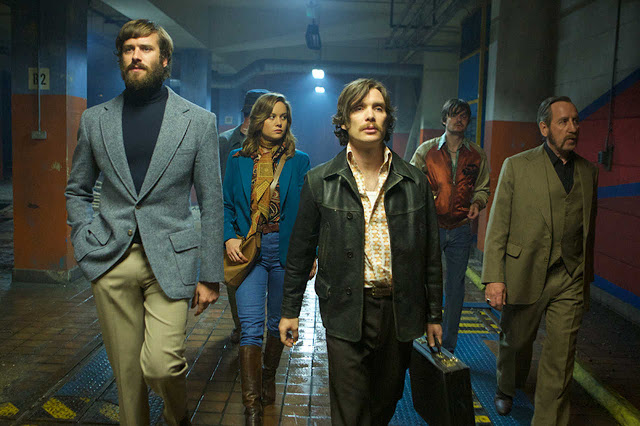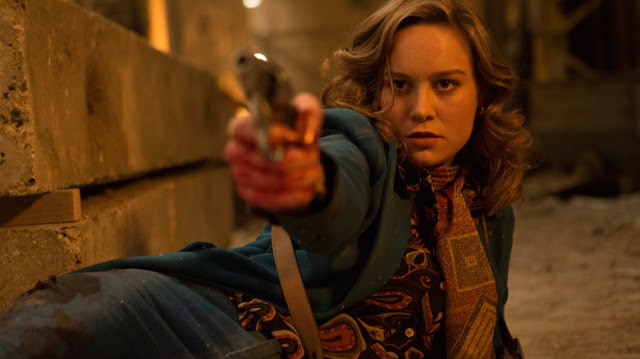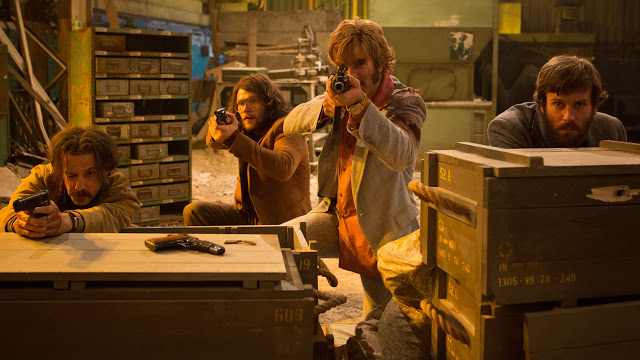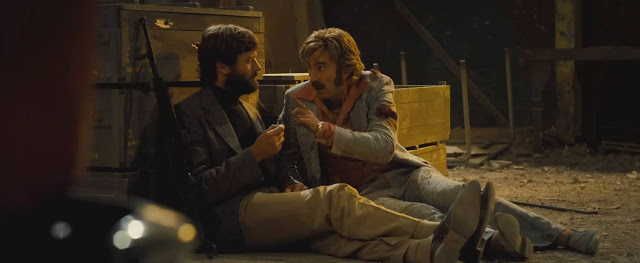Near the end of David Mamet’s Heist, two rival criminal factions engage in a shootout on a pier. It’s a fairly unremarkable scene, except that standing in the crossfire is Bergman, an irascible fence played by Danny DeVito. As the bullets whiz past him, Bergman transforms from a tough-talking hoodlum into a conciliatory wimp, yelping in protest, “Put the fucking guns down, let’s just talk!” Free Fire, the latest whatsit from the English auteur/weirdo Ben Wheatley, essentially extends this bit of off-kilter gunplay to feature length. It assembles a motley crew of hooligans, junkies, and reprobates, then sets them loose on one another in a display of inept savagery that’s more pitiful than lethal.
That phrase might also describe Wheatley’s prior films, which have relied on showy extremism to enliven themes and narratives that are fundamentally banal. These include Kill List, a glum study of blue-collar ennui that morphed into a grisly and tasteless horror movie, and High-Rise, an initially fascinating but ultimately unwatchable satire that squandered a terrific cast in favor of incoherent montage. (I haven’t seen A Field in England, but Variety assessed it as combining “imagination-teasing ingenuity” with “a startling lapse in basic storytelling competence”, which seems to fit.) Qualitatively, Free Fire represents a dramatic improvement for Wheatley, but what’s most interesting is how he’s improved. No longer straining to confound audiences with his avant-garde brilliance, Wheatley has instead chosen to wield his gifts for the old-fashioned virtue of entertainment. Free Fire has little heart and even less depth, but compared to the arduous nature of Wheatley’s past works, its breezy emptiness is oddly refreshing.
As is its simplicity. Free Fire takes place entirely in a single location, an abandoned warehouse full of rusted metal, creaky machinery, and shattered glass. (The time is 1978, which is important insofar as nobody has a cell phone, though it’s mostly an excuse for some garish costumes.) Its characters—by which I mean its delinquents and its double-crossers—are meeting to complete an arms deal, presumably for the IRA, though that hardly matters. The chief buyer is Chris (Cillian Murphy, flashing back to The Wind That Shakes the Barley), an all-business nationalist, while the main seller is Vernon (Sharlto Copley, matching his scene-chewing from Elysium), a strutting peacock with more swagger than sense. Each has his own retinue of shifty lieutenants and bullheaded muscle, all played by talented character actors; these include Michael Smiley as a crusty patriot, Sam Riley as an impetuous addict, and Noah Taylor as a grumpy flunky. There are also two intermediaries in the mix, brokers with uncertain loyalties: the curiously named Ord (Armie Hammer, excellent), a gregarious huckster with a skill for needling, and the exasperated Justine (Brie Larson, staying sharp), the group’s lone woman who, naturally, appears to possess far more intelligence than most of the men put together.
For its first act, before the bullets start flying and the bodies start dropping, Free Fire glides by as a comedy of delicious, good-hearted nastiness. Working with his regular screenwriting partner, Amy Jump, Wheatley pens a flurry of insults and goads, a roving banter that pings around the room, striking one character and then the next. Vernon politely informs Justine that she’s gained weight. The virile Ord asks the elderly Frank (Smiley) if he needs a nap. When somebody seeks pity, he’s brusquely informed, “‘Sympathy’ is in the dictionary between ‘shit’ and ‘syphilis.’”
So it is. It is also between “silly” and “symphonic”, both of which apply to Free Fire. In one sense, this movie is a pointless genre exercise, a meaningless display of cinematic violence perpetuated by one-dimensional characters. But thinness is not always the same as dullness, and there is a certain musicality to Wheatley’s dialogue, which both earns laughs and heightens the tension. With all of these jerks shooting their mouths off, it’s only a matter of time before they start actually shooting each other.
Which is, of course, exactly what happens. But even if Free Fire’s bold strokes are predictable—it’s basically “The Hunger Games meets Reservoir Dogs”—its granular details are relatively novel. In most action movies, gunfire is almost always fatal; to borrow from one cult western, you’re either quick or you’re dead. (Hell, in The Walking Dead, a bunch of random bumpkins somehow became experts in the art of the head shot.) Here, the characters prove strikingly (and, I imagine, realistically) incompetent at killing. Armed largely with small-caliber pistols, they virtually never hit their targets, and when they do, they inflict minimal damage, perhaps grazing an arm or perforating a shoulder pad. When one character does get nicked in the head, he collapses to the ground, only to announce, “I’m not dead, I’m just regrouping.”
Wheatley’s direction of this chaos is appropriately unglamorous, but it is not unwise. In effect, he structures Free Fire like an especially vicious game of laser tag, if one played by uncoordinated adults equipped with actual weapons. And so, characters take cover behind poles and boxes, occasionally darting into open space in an effort to improve their tactical position, but mostly sitting still and licking their wounds. Wheatley’s command of spatial choreography can be problematic; quite frequently, it’s difficult to determine exactly who’s where, and who’s shooting at whom—when someone shrieks, “I forgot whose side I’m on!” it’s easy to peg him as an audience surrogate. Nevertheless, there’s a spit-and-glue element to Wheatley’s approach that’s strangely invigorating.
It does suffer from diminishing returns—over time, Free Fire’s pop-gun mayhem grows tiresome and repetitive. Yet Wheatley’s lo-fi style gives his actors room to breathe, and they reward him amply, mingling a dog-eat-dog survival instinct with a low-key comic absurdity. Murphy and Larson perform yeoman’s work as the straight shooters (sorry), but it’s the more colorful supporting players who really pop: Copley’s self-obsessed mania, Riley’s gleeful repulsiveness, Jack Reynor’s (Sing Street) utter contempt. The clear standout, however, is Hammer, who turns in his most relaxed and enjoyable performance in some time; his heavily bearded Ord is a wonderfully blithe gangster who regards this entire endeavor with withering superiority, as though he’s watching these imbeciles from a distance.
“Aim with both hands, Vern,” Ord instructs lazily as the former attempts to pick off an adversary who’s slowly dragging himself across the floor. He’s dispensing advice on how to most efficiently commit murder, but Hammer delivers that line like he’s telling a cubicle mate how to transfer a phone call. Praise Ord. Pass the ammunition.
Jeremy Beck is the editor-in-chief of MovieManifesto. He watches more movies and television than he probably should.




